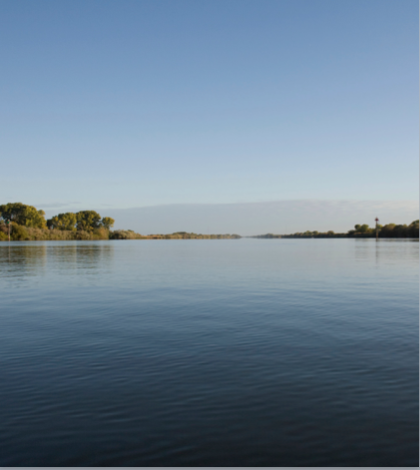In the next step toward a $175 million purchase of five agricultural islands in the Northern California Delta, the Metropolitan Water District of Southern California has signed a 103-page contract to purchase the land from Delta Wetlands Property (DWP). DWP is owned by Zurich Insurance Group, a financial services conglomerate.
The 20,000-acre purchase would provide Metropolitan a vital foothold in the Sacramento-San Joaquin River Delta and is considered a very controversial purchase with the Northern California water community and Delta landowners.
The five islands represented in the purchase—Bouldin, Bacon Island, Webb Tract, most of Holland Tract and a small portion of Chipps Island–are some of the country’s foremost farmland and a water source for residents throughout the state. The islands span portions of Contra Costa, San Joaquin and Solano counties.
Metropolitan is a water wholesaler serving local water districts and provides water to 19 million residents. The Delta is the estuary through which the State Water Project and the federal government’s Central Valley Project pump Sacramento Valley water south to thirsty residents and to parched Central Valley farms.
Two primary issues have surfaced regarding Metropolitan’s Delta land purchase. The land purchase itself is viewed as an attempt to seize additional water rights for use in Southern California and the possible use of the land for the construction of two giant tunnels proposed by Gov. Jerry Brown to ship water to southern California. Metropolitan Water is a major supporter of the governor’s California WaterFix $15.7 billion tunnels project.
For its part Metropolitan says it hasn’t finalized its plan regarding use of the islands. Steve Arakawa, Metropolitan’s director of Bay Delta initiatives, has indicated that one of the islands could be used for California WaterFix to store dirt and construction equipment. The land could also be used for wetland restoration to improve water quality and help endangered fish in the Delta, Arakawa said.
Regardless of Metropolitan’s discussions on land usage, George Hartmann, a lawyer for Delta landowners, has said will sue if the Southern California water agency doesn’t uphold land-use restrictions signed by Zurich in 2013.
“It may not be comfortable to have your opponent owning the land next door, but that’s what it is,” said Hartmann.
Metropolitan Water District has a long and storied history of land purchases outside of Southern California to secure water for its residents. Dating back almost 100 years ago, Los Angeles fought and won water rights in the Owens Valley. More recently, beginning in 2005, farmers in the Palo Verde Valley, bordering the Arizona state line, have fallowed their land in exchange for payment from Metropolitan for their California River water.
In spite of Metropolitan’s claim for possible wetland restoration, many Delta residents blame the agency for the existing Delta ecological woes. “Met is one of the actors that’s responsible for the current destruction and degradation of the Delta ecosystem, through too many years of pumping,” said Hartmann. “They’ve killed a lot fish…They claim to care about the Delta, but I don’t see how they can get anybody to believe that.”
An advocacy group, Restore the Delta, is collecting signatures in an effort to stop Metropolitan’s purchase. A leading critic of both the water agency’s purchase and the possibility of the twin tunnels, Barbara Barrigan-Parrilla with Restore the Delta has said she fears Metropolitan having a stronghold in the over-tapped Delta.
“We plan to continue fighting this in the court of public opinion and wherever else is needed,” said Barrigan-Parrilla. “It’s not over.”
Metropolitan‘s board approved the Delta purchase at their March meeting and will hold a meeting later this month to further discuss the purchase. No additional board votes are needed regarding the purchase but District Spokesman Bob Muir indicated that “If there are any red flags during escrow, they might need to take action in response.”
 California Water News Daily Your Source For Water News in California
California Water News Daily Your Source For Water News in California


